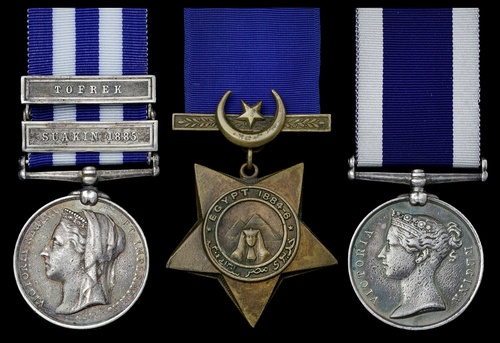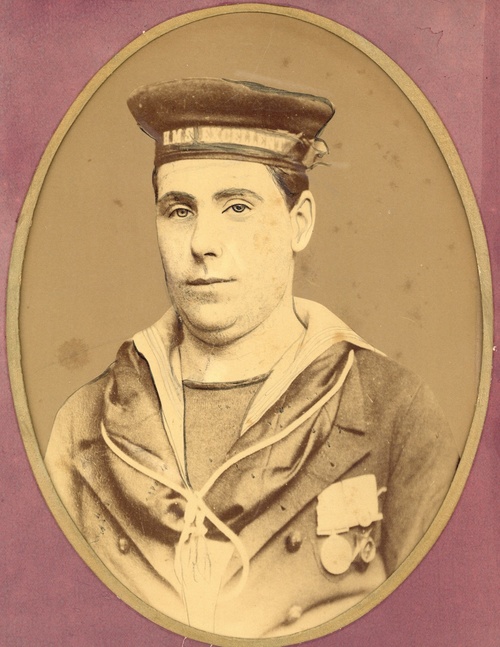Auction: 19003 - Orders, Decorations and Medals
Lot: 170
(x) 'No one excelled him as a recruiting officer or as an instructor. He had the happy knack of obtaining discipline and excellent results by good-natured banter and warm encouragement.'
John Marra's obituary in The Dundee Courier, 4 December 1922.
A fine 'Battle of Tofrek' group of three awarded to Chief Petty Officer J. Marra, H.M.S. Unicorn, late H.M.S. Excellent and H.M.S. Condor, who manned one of the Naval Brigade's Gardner Guns as his comrades fell around him in savage fighting against the Dervishes
Marra joined the Royal Naval Air Service, from the Royal Naval Volunteer Reserve, in March 1916. His gunnery experience proved invaluable at R.N.A.S. Cranwell, where he was mentioned in dispatches as an instructor of anti-aircraft weaponry
He lived out his final days as Shipkeeper of H.M.S. Unicorn, the beautiful Georgian frigate which still graces Dundee's harbour. Dying aboard her after a lifetime of service, he was given a touching farewell with full naval honours
Egypt and Sudan 1882-89, undated reverse, 2 clasps, Suakin 1885, Tofrek (J. Marra, A.B. H.M.S. Condor.); Navy L.S. & G.C. (J. Marra. P.O.1Cl. H.M.S. Excellent.); Khedive's Star 1884-86, unnamed as issued, the first with suspension post bent, pitted, nearly very fine (3)
John Marra was born at Batley, Yorkshire on 16 July 1862. Described as 'freckled' and 'ruddy', he joined the Royal Navy at Portsmouth aged 15, with the service number 104578. Bearing a tattoo of a thistle on his right forearm, Marra served as Boy 1st Class aboard the sloop H.M.S. Albatross during her three-year posting to China. Returning to Portsmouth and appointed Able Seaman, he was assigned to the Royal Naval Gunnery School before joining H.M.S. Condor for the Suakin expedition of 1885.
The Naval Brigade, in which Marra fought, comprised six officers and 43 ratings, led by Commander W. C. H. Domville of the Condor. At the Battle of Tofrek on 22 March, Sir John McNeill's British force was attacked by the Mahdist followers of Osman Dinga. The Naval Brigade operated Gardner Guns at the north and south of the outer British squares. During a bitter action lasting about 20 minutes, the northern gun crews were overrun by Dervishes, losing seven men killed and five wounded. Marra came through the action unscathed, though he would certainly have known those who were casualties. The Bluejackets returned to their ships on 6 April, and Marra was promoted to Leading Seaman on 1 December.
Serving aboard H.M.S. Excellent from 11 September 1887, Marra was advanced Acting Chief Petty Officer on 1 July 1898. He was discharged to the Royal Naval Reserve on 1 November 1907, and the following day was appointed Shipkeeper of H.M.S. Unicorn at Dundee. Unicorn is a 46-gun frigate built in 1824. Now a popular museum, she served as a Royal Navy training depot for over a century.
In March 1916, Marra joined the Royal Naval Air Service as Chief Petty Officer at R.N.A.S. Cranwell. He was mentioned in dispatches for his 'excellent work' as instructor of the anti-aircraft armament section (London Gazette 1 May 1918, refers). On 1 January 1918 he was promoted to Temporary Warrant Officer Class II, being later commissioned Sub-Lieutenant following the amalgamation of the two air services. After the Armistice he returned to the Unicorn, becoming a well-known and popular character in Dundee. On 3 December 1922, he was found dead in his cabin aboard his beloved Unicorn, having died peacefully in his sleep. The Dundee Courier led the tributes:
'One of the most popular men on the staff, C.P.O. Marra had given his whole life in service in the Navy. He joined in the seventies of last century, and had an intimate knowledge of many ports. During the war, though well over age, he enlisted in the R.N.A.S. as an instructor in gunnery, and the anti-aircraft section was his chief concern.'
The Dundee Royal Naval Volunteer Reserve turned out in full force to pay their last tribute to Marra at his funeral on 6 December. A large crowd gathered near the Unicorn as the bo'sun piped his coffin over the side. Wrapped in a Union Jack, it was placed on a naval gun carriage drawn by a party of R.N.V.R. men. His remains were interred with full naval honours in the Eastern Cemetery, Dundee. Three volleys were fired over his grave, and The Last Post was sounded. He died intestate and unmarried, leaving an estate valued at £1,946. 8s. Just days after his death, his effects were auctioned off at T. & J. Buchan Ltd., Dundee. Entitled to the British War Medal 1914-20 with M.I.D. oak leaf for his Great War service, it remains unclear whether this was ever issued; sold with roll confirmation, copied obituaries and research, and a portrait photograph of the recipient as Leading Seaman aboard Excellent, wearing his medals for the Egyptian campaign (illustrated).
Subject to 5% tax on Hammer Price in addition to 20% VAT on Buyer’s Premium. For more information please view Terms and Conditions for Buyers.
Sold for
£4,500
Starting price
£800







